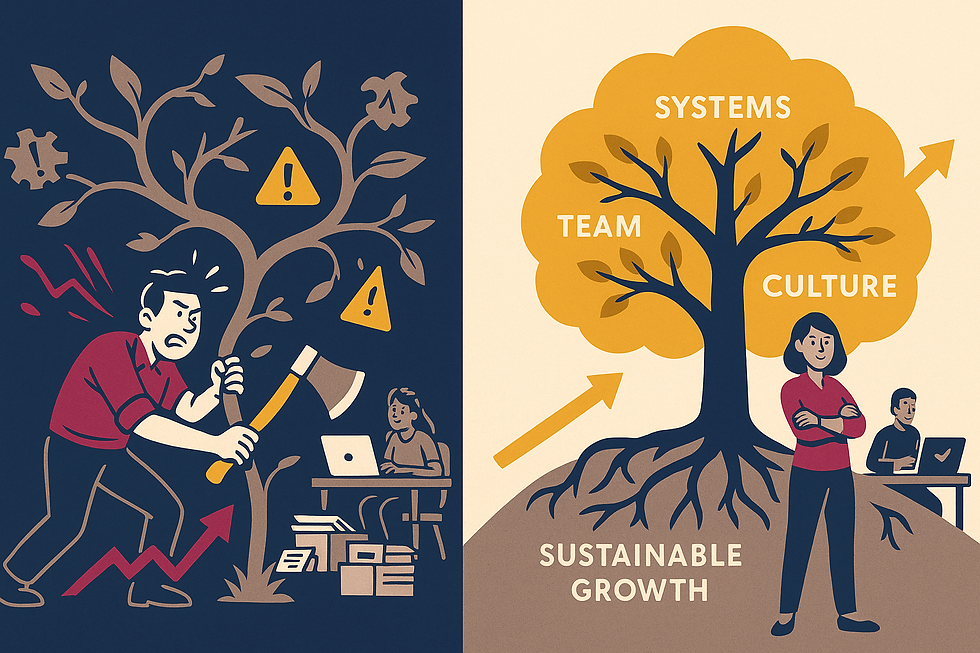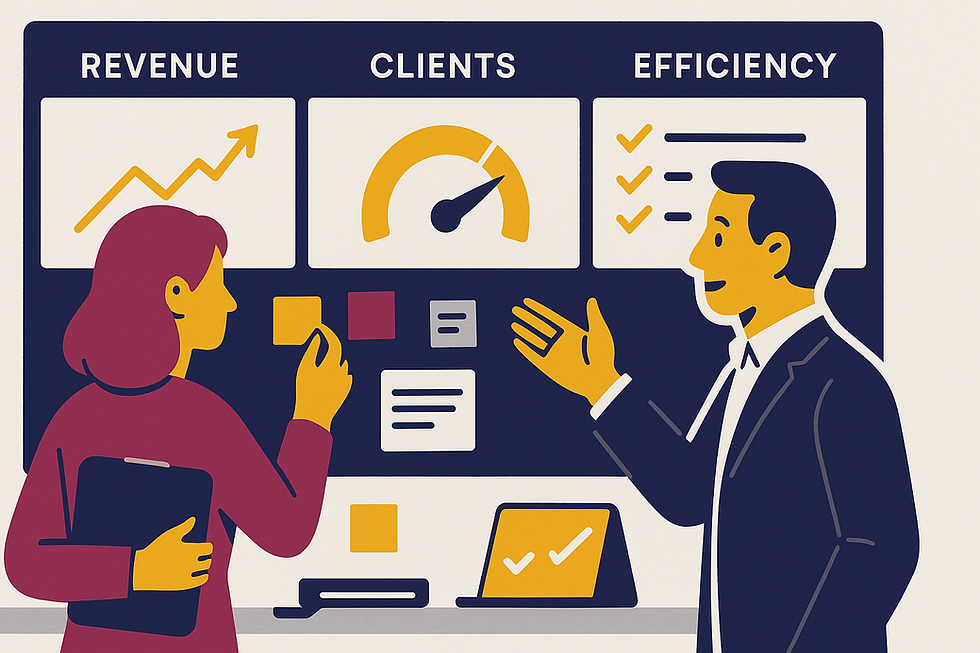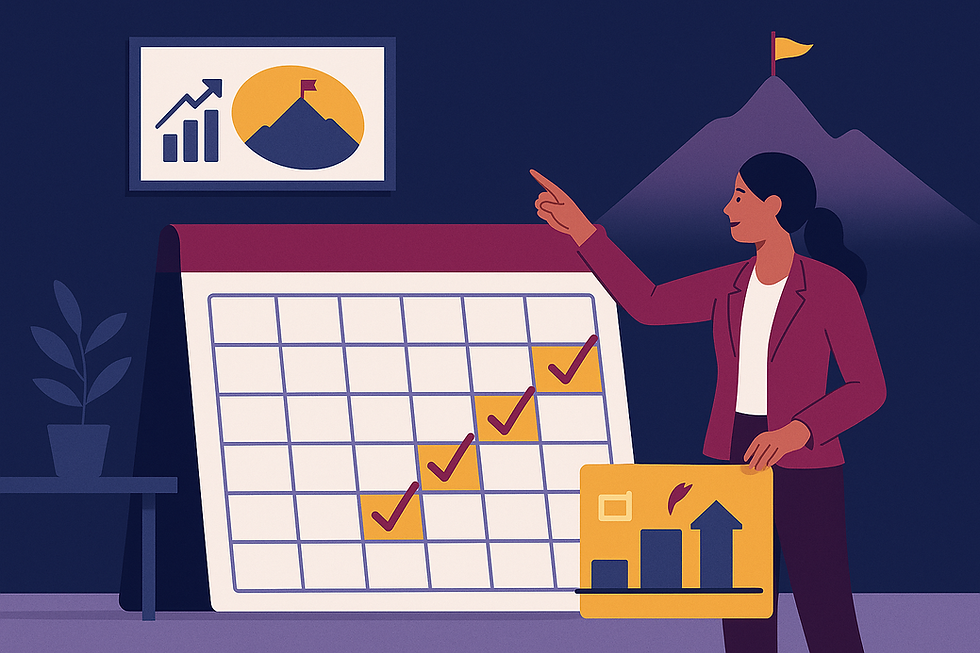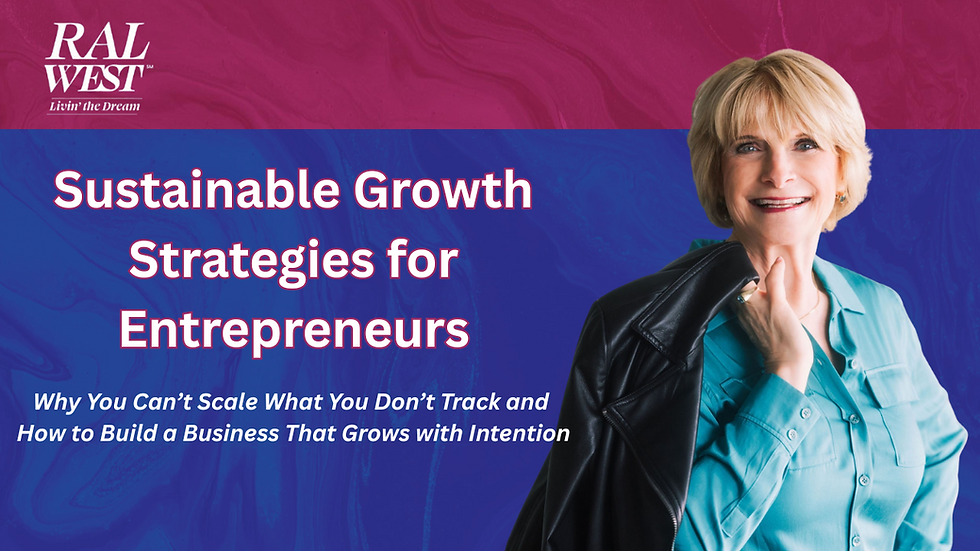Sustainable Growth Strategies for Entrepreneurs
- bryan6708
- Sep 5, 2025
- 5 min read
Why You Can’t Scale What You Don’t Track— and How to Build a Business That Grows with Intention
Introduction: Progress Doesn’t Come From Pushing— It Comes From Clarity
As entrepreneurs, we’re built to move.
We take action. We solve problems. We hustle.
But if you're not measuring where you're going, how do you know if all that effort is actually working?
Here’s the truth I’ve seen time and again—both in my own companies and in the businesses I mentor:
You can’t scale what you don’t track.
Yes, grit matters.
Yes, taking action is better than waiting for perfection.
But if you’re chasing growth without data, you’re just guessing.
And guesswork doesn’t scale.
Clarity in your metrics is what fuels sustainable, repeatable growth. It tells you where to put your energy, what to stop doing, and how to leverage your time and resources wisely.
That’s what business resilience looks like: seeing change coming—and making the first move.
Part 1: What Is Sustainable Growth (and Why Most Entrepreneurs Skip It)

Let’s define this first.
Sustainable growth means:
You can scale without breaking your systems
You can increase revenue without sacrificing quality
You can grow your team without chaos
You can step back—without the business falling apart
In other words:
Growth that’s consistent, profitable, and supported by structure.
What it’s not:
Growth that’s reliant on the founder doing everything
Growth with no visibility into costs, margins, or ROI
Growth that leads to burnout or constant course-correction
📌 Inside my Mastermind program, this is a central theme: You need growth that frees you—not growth that owns you.
Part 2: You Can’t Improve What You Don’t Measure

One of the biggest mistakes I see? Entrepreneurs are charging forward without checking the dashboard.
Here’s the simple rule:
If you don’t know what’s working, you can’t do more of it.
That applies to:
Marketing
Sales
Team performance
Delivery
Customer satisfaction
Profitability
Let’s look at what you should be tracking—and how to make it manageable.
🔍 What to Track for Sustainable Growth
✅ Revenue
Total monthly revenue
Recurring vs one-time income
Revenue by offer or product line
✅ Profit
Gross and net profit margins
Cost of delivery (how much does it cost to fulfill your promise?)
✅ Marketing
Where leads are coming from
Lead conversion rate
Cost per lead (if running ads)
✅ Client Success
Retention rate
Satisfaction scores or testimonials
Referral frequency
You don’t need a complicated dashboard.
Even a simple spreadsheet can give you insights.
The goal is clarity—not complexity.
👉 Want a proven method to grow with clarity and systems?
Watch my free training video: The 6 Principles for Lasting Business Success.
Part 3: Build Simple Systems to Track and Review Key Metrics

If the data isn’t easy to find, it won’t be used.
That’s why I always recommend entrepreneurs build a repeatable rhythm for tracking their numbers.
🧩 Start Here:
Use a Google Sheet or dashboard in Trello/Notion
Block 30 minutes each week to review your key metrics
Have your team help gather the data (VA, bookkeeper, marketing coordinator)
📌 Create a one-page “scorecard” with your top 5–7 KPIs.
Update it weekly or monthly.
Use it to make data-informed decisions, not guesses.
🔁 Questions to Ask Every Month:
What’s working that we can double down on?
What’s underperforming and needs to be improved—or cut?
What metrics are trending up (or down)?
Where can we systemize or automate based on what we’ve learned?
These questions turn tracking into action.
And that’s where real growth happens.
Part 4: Eliminate the Activities That Don’t Move the Needle

Entrepreneurs love to start things.
But sustainability requires focus.
Once you’ve built a system for tracking results, you’ll start to see what’s not pulling its weight.
And then it’s time to make bold decisions.
“If it’s not producing results—stop doing it.
If it is—optimize and scale it.”
That goes for:
Social platforms that aren’t driving leads
Offers that aren’t profitable
Processes that create extra work with little return
Part 5: Leverage Your Time Intentionally

Here’s the mindset shift that changes everything:
Growth doesn’t require more effort. It requires smarter effort.
If you want to grow sustainably, you have to buy back your time and elevate your role.
🔁 1. Automate Repetitive Tasks
Use tools like:
Calendly – for client scheduling
QuickBooks or Xero – for finances
Email templates and filters – to streamline communication
🧠 2. Delegate the Details
Not everything should be automated.
But a lot can—and should—be delegated.
Hire a VA, assistant, or project coordinator to own:
Inbox triage
Customer service
Admin tasks
Social scheduling
📋 3. Systemize Your Workflow
Map out recurring workflows
Assign responsibilities
Track progress on team goals
📌 This not only clears your plate—it helps your team know what to do without asking you.
Part 6: Think Long-Term, Act Weekly

Sustainable growth is built on repeatable weekly action that aligns with your big-picture vision.
This is where many entrepreneurs fall short:
They either think too small (just daily fires)…
Or too big (yearly goals with no traction).
The sweet spot?
Weekly execution that ladders up to your long-term growth strategy.
🧱 Your Weekly Growth Strategy Checklist:
Check your KPI dashboard
Review what's working
Plan one task to scale something effective
Eliminate one task or process that isn’t working
Delegate or automate one time-consuming activity
Do this every week—and you’ll build momentum that compounds.
Part 7: The Role of Leadership in Sustainable Growth

Your business grows as you grow.
And sustainable success depends on:
Your ability to set a clear direction
Your discipline in tracking what matters
Your willingness to say “no” to the wrong things
Your commitment to building systems others can run
📌 I’ve always taught that the entrepreneur’s highest role isn’t doing—it’s designing.
Designing the vision.
Designing the structure.
Designing the systems.
And empowering others to execute.
Conclusion: Sustainable Growth Is Built on Purpose, Not Pressure
You don’t need to burn out to build something great.
You don’t need to do more—you need to do more of what works.
When you:
✅ Track your key metrics consistently
✅ Eliminate waste and focus on what produces
✅ Systemize and delegate with clarity
✅ Align your weekly actions to your long-term vision
…you create a business that grows on purpose.
And that’s growth you can sustain.
Reflection Prompt:
What’s one metric you rely on to guide your decisions each week?
Hit reply and share it—I’d love to know what’s working for you.
🎧 Podcast Spotlight: Goalbusters
I recently had the pleasure of joining Robin J. Emdon on the Goalbusters podcast. We discussed how to finally step away from daily operations, reclaim your freedom, and scale your business without experiencing burnout.
Attached is a valuable Book Partner Media Kit—a free resource to help you build your business the smart way.
P.S. Want help building a business that support real growth—without adding stress?
Watch my free training video here: https://www.ralwest.com/six-principles
Or check out my Mastermind, designed to teach entrepreneurs like you to build scalable systems and make confident decisions https://www.ralwest.com/mastermind
Subscribe to my YouTube channel for insights on business systems, leadership, and entrepreneurial freedom: https://www.youtube.com/@RalWest
What was your biggest takeaway from this week's newsletter?





Comments